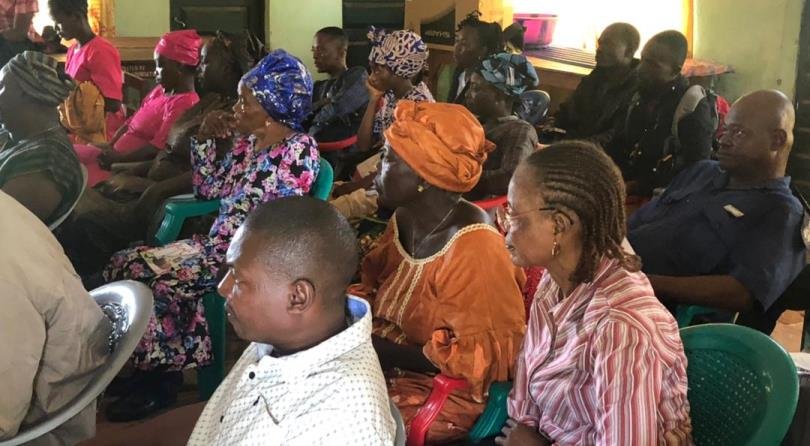By Ragan M. Conteh
Just days after President Maada Bio made clear his stance on ending Female Genital Mutilation (FGM) in the country, the momentum has soared in villages he had partly grown up as a kid.
He expressed his commitment to fighting off FGM practice during a Presidential Town Hall meeting.
He was emphasizing the importance of African cultures and outlining the Government’s plans to address the growing issue which has lately seen the death of two female teenagers in a Bondo shrine in Kambia district.
In relation to the fight, the Amazonian Initiative Movement (AIM), in collaboration with MEN ENDFGM Foundation (MEF) funded by the Wallace Global Fund, concluded a three-day training program.
This program brought together police officers, stakeholders, including chiefs, men’s clubs, soweis, and nurses, to focus on human rights, the legal experts with efforts to end FGM in the country.
Participants were also trained on the alternative rite of passage (ARPs), a bloodless modern Bondo practice , which was piloted in the Port Loko and Tonkolili Districts.
 The training sessions took place on July 28th, 29th, and 30th in Moriba Town, within the Sierra Rutile mining community in the Imperi Chiefdom of Bonthe District. Bonthe District is the birthplace and home town of President Bio.
The training sessions took place on July 28th, 29th, and 30th in Moriba Town, within the Sierra Rutile mining community in the Imperi Chiefdom of Bonthe District. Bonthe District is the birthplace and home town of President Bio.
“This workshop is part of ongoing efforts to educate vulnerable communities about the dangers associated with the practice of FGM and the urgent need to eradicate it in the country,” a statement said
In her presentations, Madam Rugiatu Neneh Turay, the Country Director of the Amazonian Initiative Movement Sierra Leone (AIM-SL), emphasized that her organization is dedicated to promoting and protecting the culture of women and girls while striving to eliminate the FGM component from the Bondo tradition.
Madam Turay continued that organizations working to end FGM are not opposed to the Bondo society itself.
She explained further, “for decades, women and communities in Sierra Leone have suffered numerous medical, social, and economic implications due to the practice of Female Genital Mutilation.”
“One of the reasons women have remained impoverished, particularly in rural areas, is because they still practice FGM. Women are devoting all their energy to FGM, neglecting the cultural aspects,” Turay stated.
 She stressed that women have lost their values by prioritizing financial gain over the social aspects of the society, which embody respect and values.
She stressed that women have lost their values by prioritizing financial gain over the social aspects of the society, which embody respect and values.
Madam Turay also noted that many women today suffer from medical health issues but are afraid to speak out due to the traditional pressures.
She highlighted that homes have been depleted, grudges have been formed, conflicts have ensued, and loft of women and girls have died because of undergoing FGM, yet the silence persists.
Madam Turay presented the legal framework on the issue and urged police officers to investigate, charge, and prosecute cases of FGM using local, regional, and international laws.
Turay also delivered a PowerPoint presentation on several topics including violence, Legal framework, and Female Genital Mutilation as well as bloodless rite for participants’ understanding and better understanding.
She emphasized that no law excludes FGM, pointing out that the violence, torture, inhumanity, killings, and physical assaults are ones associated with FGM and must be investigated and prosecuted by the police.
She also urged traditional leaders, especially chiefs, to stop granting licenses to Soweis, warning that they could be considered accomplices if deaths occur.
She spoke about the backward trend affecting women in communities, particularly Soweis who still use knives and razor blades to perform genital circumcision on women.
Madam Turay urged the focus on the education of daughters rather than spending time and resources on the harmful practice of FGM. She provided details on the alternative rite of passage, known as bloodless Bondo, which aims to separate the Bondo society from FGM, asserting that FGM is not part of Bondo.
She stated emphatically that women’s private parts should not be tampered with knives or razors. He cited the suffering of women at the Aberdeen Women Center due to FGM-induced fistula.
She highlighted that many women and girls are dying in Bondo houses and bushes due to FGM, yet these deaths go unspoken.
Madam Turay stressed that no woman or girl graduated from Bondo with a certificate, urging everyone to take precautionary measures to stop the cutting of women’s clitorises, as it has excruciating implications on their health.
Participants from various communities expressed their appreciation to Madam Rugiatu Neneh Turay and her team’s education on this practice.
Kadiatu Kamara shared her experience, “When I went to the hospital to deliver my baby, I struggled for days until doctors intervened. The education we received today will significantly have impact on the transformation of ending Bondo in Bonthe District.”
Ishmael Sandi, a police officer, mentioned the threats they face while investigating FGM cases in communities in Bonthe District, stating that, “most serious cases in our police stations have offices set up to hear out issues of Bondo society, but we are afraid to prosecute suspects there.”
Soweis and chiefs who participated pledged to work with AIM-SL and Madam Rugiatu Neneh Turay to modernize the culture and eliminate the cutting.








































































































































































































































































































































































































































































































































































































































































































































































































































































































































































































































































































































































































































































































































































































































































































































































































































































































































































































































































































































































































































































































































































































































































































































































































































































































































































































































































































































































































































































































































































































































































































































































































































































































































































































































































































































































































































































































































































































































































































































































































































































































































































































































































































































































































































































































































































































































